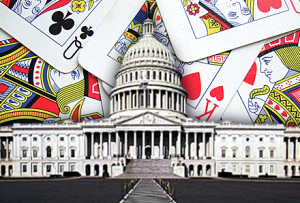In the wake of Nevada’s proposal to allow state residents to play online poker without fearing arrest and/or imprisonment, the reaction from the Nevada-based casino giants has been swift and unequivocal. Companies like Caesars Entertainment and MGM Resorts disdain the piecemeal state-by-state approach, insisting that the only sensible method of reforming America’s online gaming laws must be done at the federal level. But what exactly is happening at the federal level?
 Much hope is being pinned on the rumored bi-partisan effort in the House of Representatives led by Rep. Barney Frank (D-MA) and Rep. John Campbell (R-CA) to revive Frank’s HR2267 bill, which was approved by the Financial Services Committee last July. Some elements of Sen. Harry Reid’s failed late-2010 draft bill may also be incorporated, minus Reid’s proposed 15-month ‘blackout’ period that so dismayed US poker players.
Much hope is being pinned on the rumored bi-partisan effort in the House of Representatives led by Rep. Barney Frank (D-MA) and Rep. John Campbell (R-CA) to revive Frank’s HR2267 bill, which was approved by the Financial Services Committee last July. Some elements of Sen. Harry Reid’s failed late-2010 draft bill may also be incorporated, minus Reid’s proposed 15-month ‘blackout’ period that so dismayed US poker players.
Of course, players’ opinions matter little in Washington, DC. Hell, basic math barely counts for much in the District of Columbia. Last year, even though Democrats controlled both houses of Congress, they couldn’t muster the legislative will to bring Frank’s bill to the House floor for a vote. That seems even less likely to occur now that Republicans on the Financial Services Committee outnumber Democrats 34-27.
What’s more, anti-gambling zealot Rep. Spencer Bachus (R-AL) took last July’s vote as a real slap in the face. It seems a safe bet that Bachus, who took over chairmanship of the Financial Services Committee from Frank, would be itching for the opportunity to do some slapping of his own, should Frank and Campbell be so bold as to darken his door. There are some suggestions that pro-poker pols would attempt to circumvent the committee by attaching the bill to a crime control measure or some other procedural judo move, but that seems a long shot at best.
There are 87 new Republican members in the House, many of them having earned their stripes by parroting the Tea Party mantra of smaller government, states’ rights and dropping nuclear weapons on Kenya. As such, they may not be too eager to expand the federal government’s scope via the creation of a new regulatory body to oversee online poker. And, let’s face it, under their libertarian veneer, most of these Teabaggers are social conservatives at heart — to be seen as opening the gambling floodgates may not play well with the older evangelical Christian voters on whose goodwill they depend. At any rate, the mere suggestion of Reid’s even peripheral involvement might be enough to stop the bill dead in its tracks. Reid was Face #3 on the Tea Partier’s Guide to Recognizing the Anti-Christ, just behind President Obama and House Speaker Nancy Pelosi (D-CA).
Bottom line, variations on this new bi-partisan legislation have been circulating in the House for years. They’re a lot like dogs that chase cars, in that they make a lot of noise, attract a lot of attention, but they don’t last too long. Each previous incarnation has died with the close of the two-year Congressional cycle, only to be resurrected with great fanfare by the new House, only to die again as the pols decamp Washington and head out on the campaign trail. Of course, past performance doesn’t necessarily dictate future results, so there’s always a chance that this time around could produce a different outcome. But we doubt it. It’s because of this predictable paralysis at the federal level that states are taking matters into their own hands. The casino giants may not like it, but they may not have a choice in the matter.
